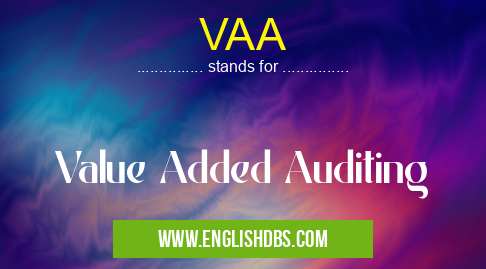What does VAA mean in GENERAL
Value Added Auditing (VAA) is a type of audit used to assess the effectiveness and efficiency of an organization's operations. It focuses on the quality of processes, systems and services used by businesses to deliver their products or services. It looks at how the organization can improve by reducing inefficiencies or cost while still maintaining the same level of quality. Unlike traditional auditing, VAA is focused not just on compliance but on finding ways to add value to an organization's operations. Its purpose is to identify opportunities for improvement and provide advice on how to increase profits or save costs.

VAA meaning in General in Business
VAA mostly used in an acronym General in Category Business that means Value Added Auditing
Shorthand: VAA,
Full Form: Value Added Auditing
For more information of "Value Added Auditing", see the section below.
What Is Value Added Auditing?
Value added auditing is a process which examines an organization's internal processes and procedures in order to identify areas where it can be improved upon. It combines financial and operational data in order to make recommendations that will help reduce costs, enhance profits, stimulate innovation and improve customer service. The process includes data gathering from sources such as financial records, employee surveys, customer feedback forms and interviews with stakeholders in order to gain a better understanding of the current state of operations within the organization. The audit then considers possible changes based on benchmarking against best-in-class organizations, industry trends and other relevant sources of information before making recommendations for implementation. The result is an action plan that can help the organization reach its business objectives without compromising its existing standards or affecting customer satisfaction levels.
Essential Questions and Answers on Value Added Auditing in "BUSINESS»GENERALBUS"
What is Value Added Auditing?
Value Added Auditing (VAA) is a unique approach to auditing whereby the auditor evaluates an organization's processes and procedures alongside traditional financial metrics in order to identify improvement opportunities, efficiencies, and cost-saving measures.
How can Value Add Audio provide benefit?
Value Added Auditing provides organizations with a comprehensive business analysis that can be used to boost performance and reduce costs. Through this VAA process, businesses now have visibility into their operations and strategies for improvement.
What does the VAA process involve?
The VAA process involves analyzing an organization's financial data from various sources as well as studying its internal controls, workflows and processes. Through this analysis an auditor develops recommendations for improvements and cost savings.
Who should be responsible for performing a Value Added Audit?
The responsibility to perform a Value Added Audit lies with experienced professionals specially trained in the techniques of financial auditing. Typically these types of audits are undertaken by independent Certified Public Accountants who understand the complexities of financial operations and accounting systems.
How often do you recommend conducting a VAA?
As every company varies depending on size, complexity and industry regulations it is important to develop a plan that best fits your individual needs. We suggest conducting periodic reviews at periods appropriate to each specific situation such as during times of significant change.
How long does it take to complete a Value Added Audit?
The time frame depends on the size and complexity of the organization being reviewed but typically most organizations will experience diminishing returns after 3-6 months of value added audits.
Final Words:
Value added auditing offers organizations valuable insights into their existing operations that can inspire creative solutions for improving performance and increasing productivity. By using this type of audit companies are able to identify areas where they could cut costs and save money as well as possible ways they could increase profits or enhance customer service levels without sacrificing quality or integrity. By implementing these changes, organizations can benefit from improved efficiency, cost savings and higher levels of customer satisfaction while still staying competitive in today's ever-changing market place.
VAA also stands for: |
|
| All stands for VAA |
